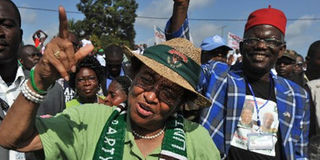Up to four dead in Liberia on eve of disputed election

Liberian incumbent President Ellen Johnson Sirleaf (C), flanked by Liberian former warlord Prince Johnson (R), greets supporters during a campaign meeting in Monrovia on November 6, 2011. Photo/AFP
Liberian riot police shot dead up to four protestors during a rally in Monrovia, opposition leaders said Monday on the eve of a run-off vote they accuse President Ellen Johnson Sirleaf of rigging.
Shooting erupted after anti-riot police and UN peacekeepers using water cannons tried to block an unauthorised march by thousands of demonstrators supporting the opposition challenger Winston Tubman.
Tubman's call to boycott the second of the west African country's second post-war polls on Tuesday drew wide international condemnation and raised fears that Liberia was being dragged back to the dark days of civil war.
"Three or four were killed and many injured. They (police) came and started shooting at unarmed people who just wanted peace," said Tubman's running mate, former football star George Weah.
AFP journalists saw two bodies, including that of a man aged around 20 with a gunshot wound to the head at the Congress for Democratic Change headquarters.
One policeman at the scene said a protestor fired the first shot but an eye witness blamed the security forces for the flare-up and the man's death.
"He was standing in front of the building when a policeman shot and I saw him going down," said witness Anita Mulba.
George Weah, who lost to Sirleaf in 2005, was defiant and told journalists: "We are going to continue the march because we are not more important than those who have been killed."
Sirens wailed throughout the city, as police attempted to disperse the protesters by firing tear gas. The UN Mission in Liberia's helicopters circled and its peacekeeping troops were out in force alongside riot police.
"We are here to ensure everything is peaceful and we are here to deter anyone who intends to destroy the peace," said UN special representative in Liberia Ellen Margrethe Loej on UNMIL radio.
The protestors, who chanted slogans such as "we want justice, we want freedom", planned to march in what appeared increasingly like a last-ditch attempt to prevent Sirleaf's re-election.
Tubman, a 70-year-old Harvard-trained lawyer, set the nation on edge with his call to boycott an election seen as a test of Liberia's fragile democracy eight years after a long and brutal conflict that left some 250,000 dead ended.
He was confident of a first round victory, mixing his education and experience with Weah's popular appeal, but he cried foul after losing to Sirleaf by more than 10 percentage points.
Tubman made several demands to the National Electoral Commission, securing the resignation of its chairman, but said he was still not convinced the process would be transparent and would not accept the outcome.
"I am in support of the boycott, our demands were not met. At times you have to do unconstitutional things for a principle in your society," Kareem Marshall, a young public administration student, said before Monday's rally.
A statement published in local newspapers by the National Electoral Commission urged the nation's 1.8 million voters to cast their ballots "without engaging in violence or confrontation."
"This election is a crucial decider of how we as a nation and as a people will continue to move towards peace, democracy and progress," it said.
The international community has condemned Tubman's boycott call after some 800 foreign observers said the October 11 first round was free and fair.
EU foreign policy chief Catherine Ashton said in a statement she "regrets the opposition's decision not to participate."
"This action deprives Liberians of the choice they deserve and weakens rather than strengthens the democratic process," she added.
The United States said it was "deeply disappointed", calling Tubman's claims of fraud "unsubstantiated."
"We are very concerned. It's a bad signal ... political leaders must be prepared to win or lose," the head of the African Union observer mission, Speciosa Wadira Kazibwe, a former Ugandan vice-president, told reporters.
Sirleaf, hailed abroad for her role in restoring the nation still heavily reliant on an 8,000-strong UN peacekeeping mission, but criticised at home, says she wants a second term to rebuild the "broken country."
Having won 43.9 percent in the first round, she is poised for re-election after winning the support of key smaller parties such as that of Prince Johnson, a notorious former warlord who was filmed ordering the torture of military dictator Samuel Doe.
"I know that nobody in this country, no matter what the talk or rhetoric, nobody really wants us to go back to war," she said while campaigning Sunday.




